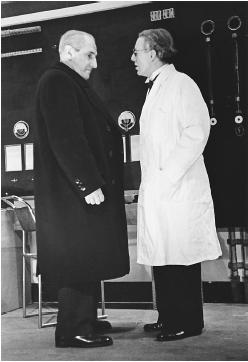Lajos Biro - Writer
Writer. Nationality: Hungarian. Born: Nagyvárad, 22 August 1880. Family: Married Yolan Veszi; two daughters. Career: Editor of several newspapers in Budapest before 1919; playwright and fiction writer in Vienna; 1924–32—worked in Hollywood; 1932—scriptwriter and executive director, London Films. Died: In London, 1948.
Films as Writer:
- 1927
-
The Way of All Flesh (Fleming)
- 1928
-
The Last Command (Von Sternberg); The Yellow Lily (A. Korda); The Night Watch (A. Korda); The Haunted House (Christensen); Adoration (Lloyd)
- 1930
-
Women Everywhere (A. Korda)
- 1931
-
The Ghost Train (Forde); Michael and Mary (Saville)
- 1932
-
Wedding Rehearsal (A. Korda); Service for Ladies (A. Korda); The Faithful Heart ( Faithful Hearts ) (Saville)
- 1933
-
The Private Life of Henry VIII (A. Korda); Strange Evidence (Milton)
- 1934
-
Catherine the Great (Czinner); The Private Life of Don Juan (A. Korda)
- 1935
-
The Scarlet Pimpernel (Young); Sanders of the River (Z. Korda): Rembrandt
- 1937
-
Under the Red Robe (Sjöström); Knight without Armor (Feyder); The Return of the Scarlet Pimpernel (Schwarz); Over the Moon (Freeland and Howard); Dark Journey ( The Anxious Years ) (Saville); Things to Come (Menzies) (co): The Man Who Could Work Miracles
- 1938
-
The Drum ( Drums ) (Z. Korda); The Divorce of Lady X (Whelan)
- 1939
-
The Four Feathers (Z. Korda): Hotel Imperial
- 1940
-
The Thief of Bagdad (Powell, Berger, and Whelan); The Way of All Flesh
- 1943
-
Five Graves to Cairo (Wilder)
- 1945
-
A Royal Scandal (Preminger)

- 1948
-
An Ideal Husband (A. Korda)
- 1955
-
Storm over the Nile
Publications
By BIRO: books—
Bálványrombolók , Nagyvárad, 1901.
A fekete ostor és más novellák , Budapest, 1911.
A vízözön, és egyéb elbeszélések , Budapest, 1911.
Kunszállási emberek , Budapest, 1912, as The Last Command , London, 1929.
Tavaszi ünnep , Budapest, 1913.
1913 , Budapest, 1914.
A diadalmas asszony , Budapest, 1921.
Harminc novella , Budapest, 1922.
Nyári zivatar , Budapest, 1922.
Házasság , Budapest, 1926.
With others, The Last Command (script), in Motion Picture Continuities , edited by Frances Taylor, New York, 1929.
A Molitor-ház , Budapest, 1931.
With Arthur Wimperis, The Private Life of Henry VIII (script), edited by Ernest Betts, London, 1934.
Gods and Kings: Six Plays , London, 1945.
Szolgák országa , Budapest, 1957.
On BIRO: article—
Film Kultura (Budapest), December 1985.
* * *
A prolific and celebrated Hungarian writer of the old school, Lajos Biro was originally a journalist and drama critic who, based in Vienna, published some 30 volumes of romantic plays, novels, and short stories, much of this work translated into German and other languages. He left Hungary after the First World War and worked variously in Rome, Paris, and Berlin as well as Hollywood, where in 1924 he became primarily a successful screenwriter for silent film. His earlier credits included an acknowledgement for his play The Czarina as the basis for Ernst Lubitsch's film Forbidden Paradise , while another of his plays, Hotel Imperial , was adapted three times for the screen, the last as Billy Wilder's Five Graves to Cairo .
In the 1930s Biro became one of the highly creative team of Hungarian film writers, artists, and executives assembled in England by Alexander Korda for his newly established production company, London Films. He was to remain in close association with Korda until his death in 1948. He co-scripted Korda's first British film, Service for Ladies ; he acted as staff "dramaturge," or script supervisor, not only on those films Korda himself directed, such as The Private Life of Henry VIII , Rembrandt , and An Ideal Husband , but those he produced, including Czinner's Catherine the Great (another adaptation of The Czarina ), Harold Young's The Scarlet Pimpernel , Jacques Feyder's Knight without Armour , Tim Whelan's The Divorce of Lady X , and Zoltan Korda's Sanders of the River , The Drum , The Four Feathers , and The Thief of Bagdad . No doubt Korda's implicit trust in Biro began with their early association and collaboration in Hungary and subsequently in Hollywood. He also worked on H. G. Wells's film The Man Who Could Work Miracles and (uncredited) Korda's abortive production of I, Claudius , and at one stage acted as script adviser to Winston Churchill when Korda invited the future Prime Minister to prepare a script about his ancestor, the Duke of Marlborough.
—Roger Manvell
Comment about this article, ask questions, or add new information about this topic: